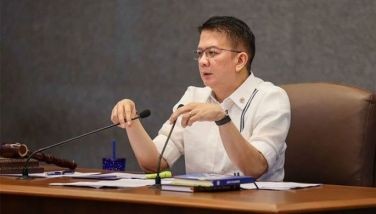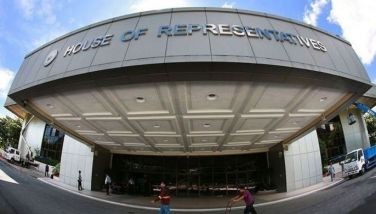The costs fly high starting July
July 2, 2005 | 12:00am
Pursuant to R.A. 9337 which is the final version of the controversial E-VAT measure, the people's "ulcers" painfully begin to gnaw their financial innards beginning this July.
For one, the increase from 32 to 35 percent on the corporate tax, while appearing as a minuscule 3 percent hike, will disrupt the consumers' family budgets. This aspect is better appreciated when one factors in the fact that practically all business sectors and trade movements are dictated by corporations which set the pace and the prices. Needless to state, such increase is passed on to the ultimate customers or end-users.
For another, the reformed E-VAT law, courtesy of a congressional cop out, has scuttled and done away with the "no pass on to the consumers" proviso on the sale of power and petro products, in the original House bill. It was the "bicam", and ratified pro forma by both chambers, that scrapped the "no pass on" saving grace, to the chagrin of taxpayers.
Hence, this July the government imposes the 10 percent tax on oil and power, albeit the Department of Energy (DOE) assures that the VAT on oil will be "substantially less than 10 percent" because of "mitigating measures to reduce the impact".
What the DOE has touted refers to the removal of the excise tax on the petro products by P1.63 per liter, and the reduction of its import duties from 5 to 3 percent, or about P0.50 per liter. A varying reduction of import duties on premium unleaded gasoline at P0.40 per liter, and the removal of excise tax on kerosene and fuel oil by P0.60 and P0.30 per liter, respectively, would also cushion the VAT impact.
But wait, on the 28th of June, it was flashed on the tv news bulletin that Department of Finance "USec Bonoan assures the public" that the VAT on fuel and electricity will not exceed 8 percent. Based on the present pump prices of gasoline at P32 per liter or more, and still growing, 8 percent thereof is P2.56 per liter as VAT.
Comparing the DOF estimate of 8 percent, or P2.56 per liter as VAT, with that of DOE to be "substantially less than 10 percent", it's obvious that the DOF and DOE have not ironed out their acts together. Any math moron knows that 8 out of 10 is, definitely, not "substantially less".
Just to stress, with the estimated 8 percent, or P2.56 per liter as VAT component, when a motorist fills up at a gas pump station for, say, just 10 liters, it is P25.60 extra expense; or P51.20 for every 20 liters of gasoline, and so on.
What about the 10 percent VAT on electricity which, like oil or petro products, is no longer exempt from the VAT? Surely, one direly expects that the E-VAT on power, as well as on air and water transport, will spell out optimum strain on the already strained pockets of the poor, the middle, and the upper middle class Filipinos. Never mind the rich or the "can afford".
The DOE wants power distributors to petition for a revised "lifeline rate structure" for marginalized end-users, ostensibly to ease off the VAT burden. Meantime, PAL will pass on the 10 percent VAT on ticket and cargo fees of its domestic runs; hence, a one-way base fare of P3,500 for the Manila-Cebu route becomes P4,713.50 with VAT and other add-ons.
Soaring prices of goods and services - even those exempt from the VAT because of the "domino effect" - will be the order of the times. This July is just the start. Come January, 2006 the president - whoever is the fated one - is authorized by R.A. 9337 to increase the VAT from 10 to 12 percent and, the costs of living - and even dying - shall have soared to such immeasurable height beyond one's comprehension!
For one, the increase from 32 to 35 percent on the corporate tax, while appearing as a minuscule 3 percent hike, will disrupt the consumers' family budgets. This aspect is better appreciated when one factors in the fact that practically all business sectors and trade movements are dictated by corporations which set the pace and the prices. Needless to state, such increase is passed on to the ultimate customers or end-users.
For another, the reformed E-VAT law, courtesy of a congressional cop out, has scuttled and done away with the "no pass on to the consumers" proviso on the sale of power and petro products, in the original House bill. It was the "bicam", and ratified pro forma by both chambers, that scrapped the "no pass on" saving grace, to the chagrin of taxpayers.
Hence, this July the government imposes the 10 percent tax on oil and power, albeit the Department of Energy (DOE) assures that the VAT on oil will be "substantially less than 10 percent" because of "mitigating measures to reduce the impact".
What the DOE has touted refers to the removal of the excise tax on the petro products by P1.63 per liter, and the reduction of its import duties from 5 to 3 percent, or about P0.50 per liter. A varying reduction of import duties on premium unleaded gasoline at P0.40 per liter, and the removal of excise tax on kerosene and fuel oil by P0.60 and P0.30 per liter, respectively, would also cushion the VAT impact.
But wait, on the 28th of June, it was flashed on the tv news bulletin that Department of Finance "USec Bonoan assures the public" that the VAT on fuel and electricity will not exceed 8 percent. Based on the present pump prices of gasoline at P32 per liter or more, and still growing, 8 percent thereof is P2.56 per liter as VAT.
Comparing the DOF estimate of 8 percent, or P2.56 per liter as VAT, with that of DOE to be "substantially less than 10 percent", it's obvious that the DOF and DOE have not ironed out their acts together. Any math moron knows that 8 out of 10 is, definitely, not "substantially less".
Just to stress, with the estimated 8 percent, or P2.56 per liter as VAT component, when a motorist fills up at a gas pump station for, say, just 10 liters, it is P25.60 extra expense; or P51.20 for every 20 liters of gasoline, and so on.
What about the 10 percent VAT on electricity which, like oil or petro products, is no longer exempt from the VAT? Surely, one direly expects that the E-VAT on power, as well as on air and water transport, will spell out optimum strain on the already strained pockets of the poor, the middle, and the upper middle class Filipinos. Never mind the rich or the "can afford".
The DOE wants power distributors to petition for a revised "lifeline rate structure" for marginalized end-users, ostensibly to ease off the VAT burden. Meantime, PAL will pass on the 10 percent VAT on ticket and cargo fees of its domestic runs; hence, a one-way base fare of P3,500 for the Manila-Cebu route becomes P4,713.50 with VAT and other add-ons.
Soaring prices of goods and services - even those exempt from the VAT because of the "domino effect" - will be the order of the times. This July is just the start. Come January, 2006 the president - whoever is the fated one - is authorized by R.A. 9337 to increase the VAT from 10 to 12 percent and, the costs of living - and even dying - shall have soared to such immeasurable height beyond one's comprehension!
BrandSpace Articles
<
>
- Latest
- Trending
Trending
Latest
Trending
Latest
Recommended

February 22, 2025 - 12:00am


























